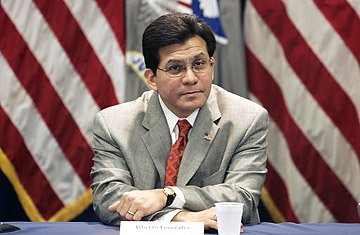
U.S. Attorney General Alberto Gonzales.
The strangest event so far in the U.S. attorney-firing mess may be the decision by a Justice Department lawyer to plead the Fifth rather than risk incriminating herself in testimony before Congress Thursday.
Monica Goodling, counsel to Attorney General Alberto Gonzales and liaison to the White House, cited the politically charged and "perilous environment" of the House and Senate judiciary committees in refusing Monday to testify about her part in the firing of eight U.S. attorneys. In a letter to the Senate committee, her lawyer says the "potential for legal jeopardy" from "even her most truthful and accurate testimony" is "very real," and cites the recent conviction of I. Lewis Libby for lying during a CIA-leak investigation.
To use a technical legal term, huh?
Before Goodling, 33, can assert the Fifth Amendment privilege against self-incrimination, she must believe that her testimony could somehow lead to evidence that she committed a crime. So what's the crime she's worried about? The mention of Libby suggests that it's perjury, but as Professor Orin Kerr, a criminal law expert at George Washington Law School, points out, you can't take the Fifth to avoid being prosecuted for lies you plan to tell under oath.
Another possibility is that she believes Democratic members of Congress are on a mere witch hunt and will cook up charges against her, no matter what she says under oath. Her lawyer's letter alludes to this by mentioning that some members have already decided they were lied to by Bush Administration officials, and plan to "use the hearings to promote [their] political party." As a reason to plead the Fifth, though, "That's a new one," says Kerr. "I don't think I've ever come across that one before."
More plausible is that Goodling suspects committee members of planning a "perjury trap," trying to catch her in a lie. And even if she does tell the truth, the committee could still get her if her testimony contradicts what others have told the committee, creating inconsistencies that might "leave her liable for at least being indicted for perjury," explains Professor Randolph Jonakait of New York Law School. Goodling's lawyer implies that this is a possibility when he mentions in the letter "a senior Department of Justice official" — widely believed to be Deputy Attorney General Paul McNulty — who has admitted to being "not entirely candid" and claimed Goodling "did not inform him of certain pertinent facts" before previous appearances before Congress.
Finally, there may actually be fire under all the smoke surrounding the investigation. If, as some have argued, U.S. attorneys were dismissed to stop them from pursuing cases against Bush Administration allies, Goodling might find herself involved in a possible conspiracy to obstruct justice. "Many federal criminal statues are written incredibly broadly," explains Jonakait. Laws against "obstruction of justice might be one of them."
Goodling's role in the dismissals is unclear, but her name has appeared on several Justice Department emails released to Congressional investigators. The emails suggest that she was in on the planning for the firings and the attempts to limit the negative fallout. Her job as liaison between the Justice Department and the White House may put her in a good position to explain how involved President Bush and his staff were in getting rid of the eight federal prosecutors.
If committee members believe Goodling's testimony is sufficiently valuable, they could offer her immunity from prosecution, leaving her without an excuse for refusing to testify. Or they could hold her in contempt of Congress. According to Kerr, federal law provides that a subpoenaed witness who refuses to testify or "to produce papers upon any matter under inquiry before either House ... or any committee of either House of Congress" shall be guilty of a misdemeanor "punishable by a fine of not more than $1,000 nor less than $100 and imprisonment in a common jail for not less than one month nor more than twelve months."
But history teaches us that a far more likely outcome is that Congress and Goodling will work things out. In a situation involving such a politically charged atmosphere, the antagonists invariably prefer a political resolution.
